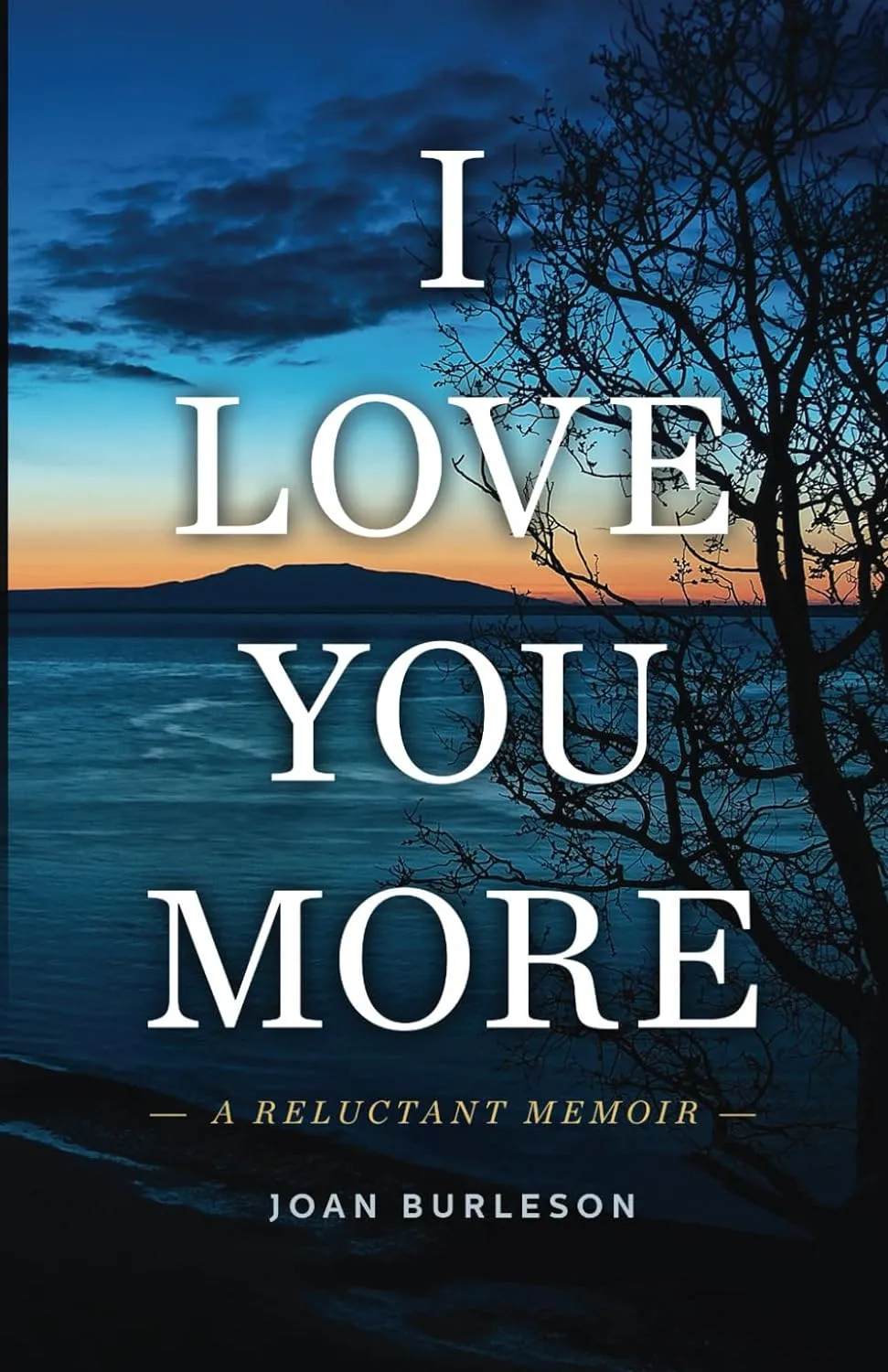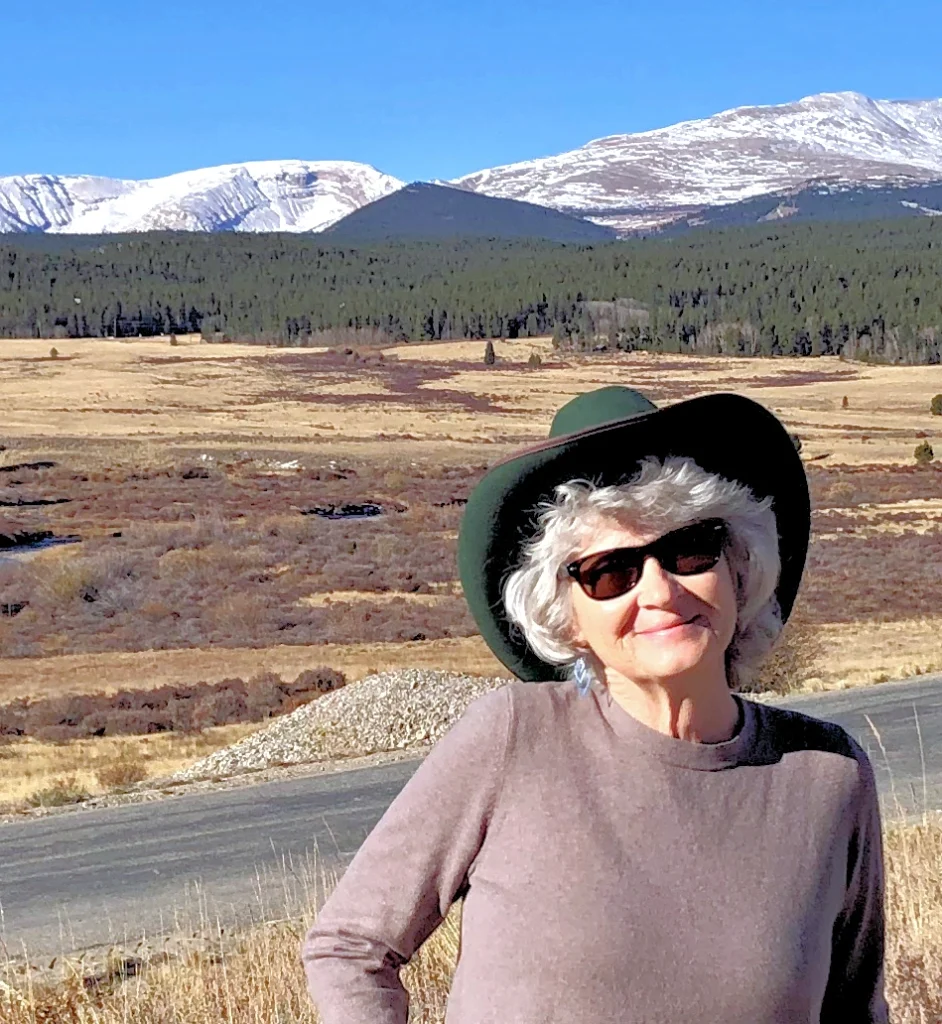
An Interview with Joan Burleson
Words By Joan Burleson, Interviewed by Evan Sheldon
In I Love You More: A Reluctant Memoir, you mention your mother wanted you to write this story, and you usually do as your mother wants. In addition to this motivation, what else led you to write this book?
I wanted to address some deeper confusions I had about my childhood. I wanted to research and understand the truth because I wasn’t confident in the stories I’d been told my whole life. Searching for the truth led to writing, and writing led to the truth. After that happened, and with my mom’s encouragement, the story took on a life of its own.
Projects will do that! I’d like to talk about your choices regarding content. This story spans many years and many miles, beginning in the Appalachians and tracing back family lines. Was this one of the ways I Love You More took on a life of its own? What was it like as a writer to decide which places, people, and events to include in such an expansive project?
Choosing the places to write about was easy because each place is a character in the story, in its own right; they each hold a place factually, thematically, and emotionally. While that wasn’t an issue, how much life to give these places was difficult. I would have given them much more, but I already had 400 pages of content. I love to write about places. Describing them is fun for me; evocative nature writing is what I aspire to, quite frankly.
In terms of events, let me address my choices in terms of structure. This was tricky for me; I struggled with how to best present everything. Eventually, I realized chronologically was the best way… it’s an easy choice for readers to follow. However, I bookended this story with the present day as the frame, in which I meet with my father and present him with my questions. It took a while for me to come to that decision. What I came to realize is it was better for both myself, and the story to let the reader know from the very first chapter that this awful thing happened. I didn’t want to be coy about it because there was already enough to tease out and develop.
Another aspect of this decision that ties into character choices was my inclusion of Trudeau, the cop. Trudeau is a major character. I struggled with this choice until it became clear to me that you can’t include a cop until you have a crime, but the crime doesn’t happen until halfway through the book. So, I had to put it in context by disclosing that I only know about many details of the crime because Trudeau gave me the information. I realized that by just telling the readers what I know up front, and why, it gives me credibility. That was a choice related to structure that was harder, but in the end, I was very happy with it. The reader came along with me on my journey.
In a different interview, you mentioned the only structure you could tell this story through was as a memoir through your eyes. Can you speak about how you came to that decision?
I came to that decision through painful and excruciating trial and error! When you take writing classes, the teachers will tell you to explore different writing styles, and even copy them, much like a painter may copy the Mona Lisa as an exercise. They’ll say, “Well, pull up Tennessee Williams and try something that he did. Try it on.” So as exercises, I “tried on” various styles and literary devices to see how they felt. Writing can be very tedious work, so why not have fun and go off on a tangent every now and then? It’s like candy! My advice to writers is to just let yourself go and don’t take yourself too seriously; see what sparks from experimenting.
While working on I Love You More, I tried writing this memoir in third person and second person, but neither of these perspectives made sense; it wasn’t accomplishing the purpose of this project, which was to get my feelings out. So, I think it was inevitable that this story be written in first person.
Did the writing process of I Love You More differ from your other writing ventures?
Yes. Before I decided to write I Love You More, I had a job which required me to write pieces that were more technical and not conducive to telling a story. I had to learn not only how to write a story, but how to structure a story. I’m not saying you need a PhD, but you need to know some principles. I realized I had a big hole in my writing education, so I went to fill it at workshops with Lighthouse Writers, who do a great job. They made me become a better reader, and it certainly helped my writing. I would encourage anyone in a similar situation to get help; Lighthouse gave me vital feedback and helped me get on track when I was flailing about.
Another important note about my process for writing I Love You More is that even though I did all this learning on how to write story, I wasn’t being deeply honest with myself. At first, I didn’t know that was the case. I wasn’t consciously trying to hide anything; I just didn’t realize that I needed to delve deeper. Erika Krouse, a mentor I met through Lighthouse, was so generous with her time in helping me with I Love You More. She was very gentle about it, but she made me realize that I wasn’t addressing the big questions raised by the book. This forced me to address those questions, and in doing so, I became honest with myself. I highly recommend her book, Tell Me Everything: The Story of a Private Investigation, in which she bared her soul, which gave me the courage to be brutally honest and totally vulnerable in my own writing.

Aside from writing, you’re also an artist, working primarily with glass. I’m curious about the creative process of fusing glass, and how it’s similar and different to working with words.
The beginning of both art forms starts with a glimmer. When I see light through colored glass, it just makes me happy. It’s beautiful to witness the incredible colors of colored glass come to life when lit up. That moment is what I call a glimmer. Writing, especially nature writing, needs to start with a glimmer: a moment you have all by yourself where you witness something beautiful—or even something awful—that moves you. That glimmer compels you to take the next step, which is to preserve it, getting it down and recreating it.
The actual work of glass fusing is very painstaking. There’s a lot of trial and error, at least when I was just starting out. That fits my personality: I’m an organized, picky person with a strong work ethic. My mother taught me to finish what you start, and that helped with putting together the different pieces of my book, finishing it, and publishing it. Like we discussed earlier, I Love You More took on a life of its own. But once it got that life, I couldn’t let it go! I had to finish it. Even when I realized it needed improving, I never gave up; with writing, you have to tell yourself if it’s not perfect, the next draft will be better, but you have to keep going! As an author, that picky side of myself is always looking for areas to improve or wishing I wrote x instead of y. It’s important not to quit what you start, but once your work is finished and out in the world, it’s not your work anymore. You have to let it go. It’s the same with glass.
What’s the most important thing you learned through the publishing process?
It’s important to clarify your goals with selling and marketing your project. With I Love You More, I decided I would not do the needle-in-the-haystack approach where I hope and hope against all hope that somebody would notice me and I’d get an agent. I decided to go with a hybrid publisher, meaning they’re not one of the big publishing houses; there’s more independence on the author’s end, but they help you with the process.
That meant I wasn’t going to end up in Barnes and Noble or have a hardcover version of I Love You More because it goes through a different system. But I didn’t care about that; I just wanted to tell my story. The amount of control I had during the publishing process was critical to me, I designed the cover myself, using a beautiful Alaskan photograph by David Parkhurst, and the book is available on both Amazon and e-readers; these are the things that really mattered to me.
Your author bio mentions another project that you’re currently working on called Light Through Colored Glass. Can you speak about this project and how working on it has differed from writing a generational memoir?
Light Through Colored Glass is a collection of short stories I’m working on. I want to finish some of the stories I tried to tell in I Love You More but was not able to for various reasons. I also have a growing list of other ideas. I’m planning to go to Juneau for a week in May to focus on this collection. I’m making an appointment with myself to work!
Lastly, I’d like to circle back around to I Love You More. There’s a line at the end that says, “My brave mother chose happiness over despair, so that is her destiny. If I can muster the strength to choose love over anger, grace will be mine.” Did writing this book help you choose love?
Absolutely. Mother Theresa said, “If we really want to love, we must learn how to forgive”; Gandhi said, “The weak can never forgive. Forgiveness is an attribute of the strong”; and Paul Boese said, “Forgiveness does not change the past, but it does enlarge the future.” Although I had to absorb these basic principles on my own, all the research and writing helped me in my journey toward forgiveness. At the end of the day, what I do know is that it was critical for me to forgive in order to move on and experience the love, and the life, I wanted.